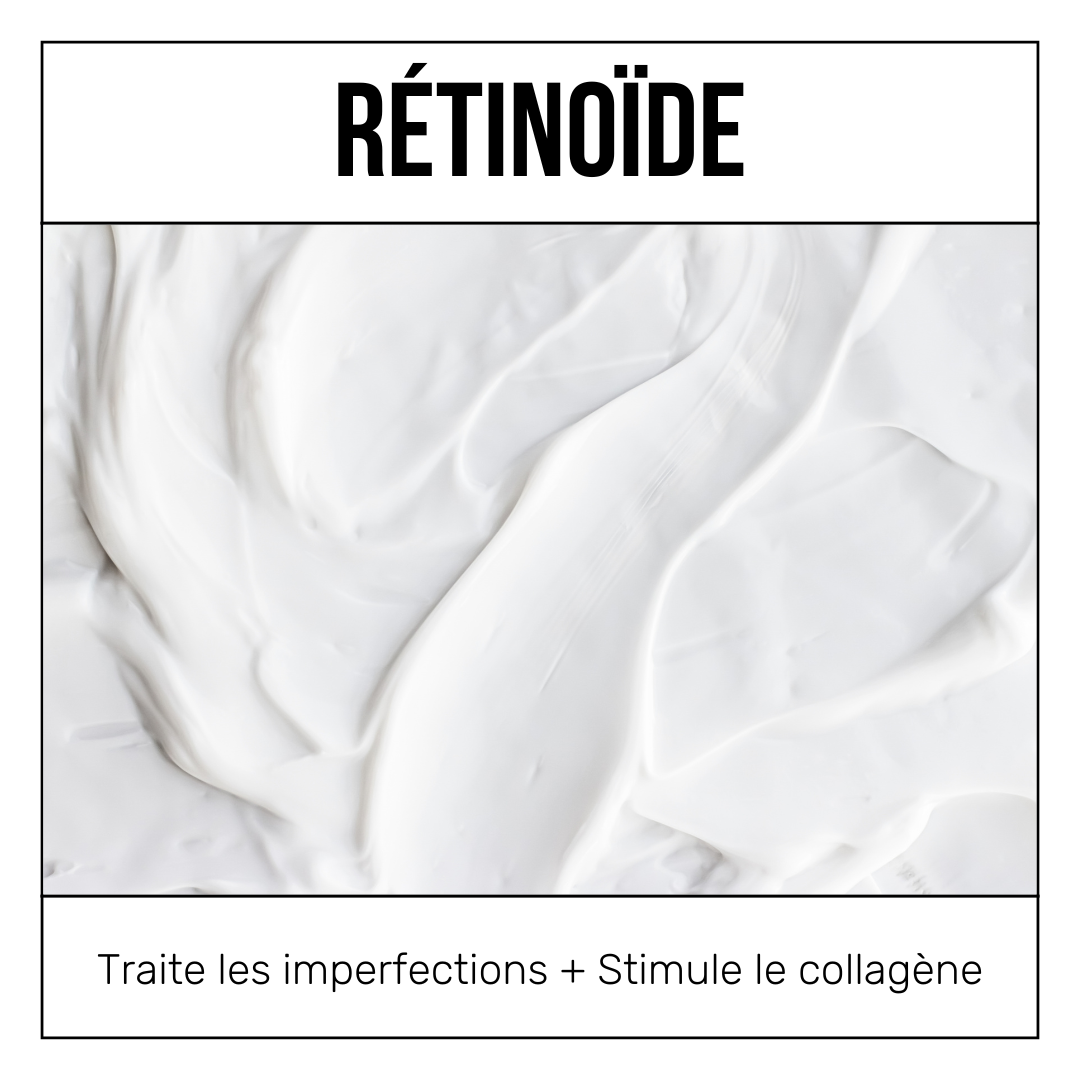
How does retinoid affect the skin?
Share
Retinoids are vitamin A derivatives widely used in dermatology for their many benefits to the skin. Whether treating acne, rejuvenating the skin or managing the signs of aging, these compounds play an essential role thanks to their regenerative and skin-stimulating properties.

What are retinoids?
Retinoids are derivatives of vitamin A, essential for many biological processes in the human body, including cell development, vision and immune function. In dermatology, retinoids are widely used for their beneficial properties on the skin. They are available in different forms and concentrations, each with specific effects on the skin.
Retinoids work primarily by regulating cell renewal and promoting epidermal cell differentiation. This means they help speed up the skin's cell renewal cycle, which can be particularly beneficial in treating acne, reducing wrinkles and other signs of aging, and evening out skin tone.
Retinoic acid (or all-trans-retinoic acid) is the most active form of retinoid, acting directly on specific nuclear receptors present in skin cells. It is often used in higher concentrations and may require a medical prescription due to its potency and potential effects on the skin.
Other forms of retinoids, such as retinol, retinyl palmitate and other retinol esters, are also used in cosmetics and skincare products. These forms are generally less irritating than pure retinoic acid and may be better tolerated by sensitive skin, although they may require continuous use for visible results.
In summary, retinoids are vitamin A-derived compounds that offer a wide range of skin benefits, from managing acne to promoting younger, healthier skin. Their use often requires a personalized approach tailored to specific skin types and concerns, under the supervision of a healthcare professional or dermatologist to maximize benefits while minimizing potential adverse effects.
Beneficial effects on the skin
1. Acne treatment
Retinoids are renowned for their effectiveness in the treatment of acne. They work by unclogging pores, reducing sebum production and preventing the formation of comedones. This helps treat existing acne while preventing new outbreaks.
2. Skin rejuvenation
For mature skin, retinoids are precious allies. They promote cell renewal, helping to reduce brown spots, fine wrinkles and other visible signs of aging. By stimulating collagen production, they contribute to firmer, more toned skin.
3. Preventing the signs of aging
Early use of retinoids can delay the appearance of signs of skin aging, such as wrinkles and loss of firmness. By strengthening the skin's structure and improving its texture, they promote a more even, luminous complexion.
4. Sensitivity and safety
Although powerful, retinoids can be irritating to sensitive skin, especially when used in high concentrations. However, gentle, slow-acting formulations can minimize these undesirable effects. Retinol esters, such as retinyl palmitate, are often preferred for their gentleness and enhanced tolerance.

What are the side effects of retinol?
1. Irritation and skin sensitivity
Skin irritation is one of the most common side effects of retinol. Excessive use or rapid introduction of the product can cause dryness, redness, itching and peeling of the skin. People with sensitive skin are particularly susceptible to these reactions.
2. Increased sensitivity to sunlight
Retinol makes the skin more sensitive to UV rays. It is therefore crucial to use adequate sun protection during the day to reduce the risk of sunburn, skin damage and irregular pigmentation.
3. Allergic reactions
Although rare, some people may develop allergic reactions to retinol. This may manifest as redness, rash, tingling or swelling of the face. In the event of an allergic reaction, we recommend that you stop using the product immediately and consult a health professional.
4. Dryness and desquamation
Retinol may cause increased desquamation of the skin, particularly at the start of use. This can manifest itself as dry, flaky skin and sometimes a feeling of tightness.
5. Redness and inflammation
Some users may experience persistent redness or inflammation of the skin, especially if retinol is used excessively or too frequently.
6. Temporary increase in skin imperfections
When you start using retinol, it's common to experience an initial phase of worsening of existing skin imperfections. This is often called "purging" and is caused by accelerated cell renewal, which can push impurities to the skin's surface before improving.
7. Inappropriate use in pregnant women
The use of retinol or retinoids in general is not recommended in pregnant women because of the potential risk to fetal development. It is recommended to consult a health care professional before using retinol-containing products during pregnancy or while breast-feeding.
Precautions and contraindications
It is crucial to note that the use of retinoids may be contraindicated in pregnant women due to the potential risk to the fetus. In addition, some studies have suggested a correlation between retinoid use and psychiatric disorders in some individuals, although this association still requires further research to be fully understood.
Conclusion
In summary, retinoids offer a multitude of skin benefits, from fighting acne to promoting younger, healthier skin. However, their use should be supervised by a healthcare professional to maximize results while minimizing potential risks, especially for individuals with sensitive skin or specific medical conditions. If you have any questions about the use of retinoids, we recommend that you consult a qualified dermatologist for a personalized treatment tailored to your needs and skin type.
